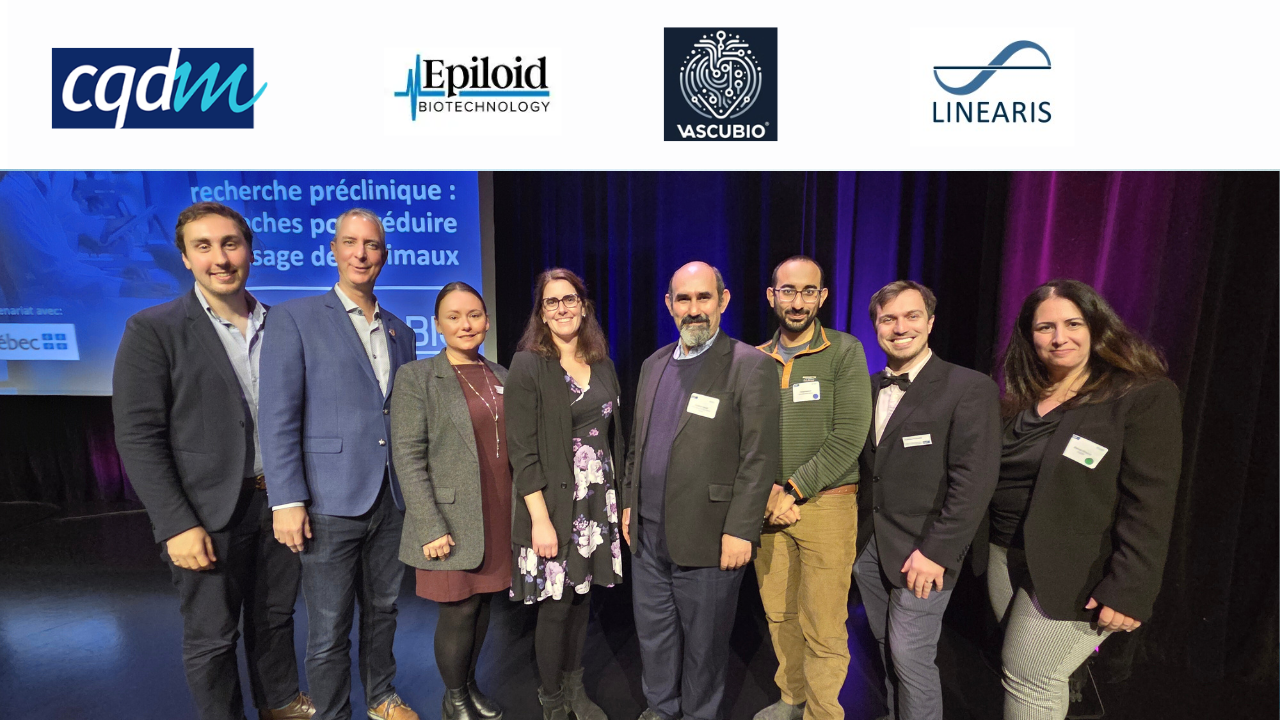
Announcement
Montreal, November 20, 2025 – CQDM is proud to announce the funding of two collaborative research projects that share a common goal: reinventing preclinical research by reducing the use of in vivo testing. Valued at a total of $1,145,874, these projects are made possible through a grant from the Government of Quebec awarded by CQDM via the SynergiQc program.
Mini-Brains to Accelerate the Development of New Epilepsy Therapies
Developing treatments for neurological diseases remains a major challenge, largely due to the complexity of the blood-brain barrier and technical limitations in studying cellular changes related to a drug’s mechanism of action. VascuBio Innovation and Epiloid Biotechnology, in collaboration with Houman Savoji, lead investigator at CHU Sainte-Justine, Associate Professor in the Department of Mechanical Engineering and Institute of Biomedical Engineering at Polytechnique Montreal, and Montreal TransMedTech Research Chair in 3D Bioprinting and Regenerative Medicine, have combined their expertise to create vascularized brain organoids-on-a-chip. These organoids mimic viable nerve cells ready for drug testing, reducing the time between discovery and clinical application. Organoids developed by VascuBio, combined with artificial intelligence technology designed by Epiloid, make it possible to predict treatment effectiveness with unprecedented precision. This approach promises to significantly accelerate the development of new therapies.
Conducted in Houman Savoji’s lab at CHU Sainte-Justine, this project will enable VascuBio and Epiloid to strengthen their expertise and competitiveness while contributing to advances in regenerative medicine. It paves the way for a new generation of innovative tools and offers these companies the opportunity to expand their service portfolios. Ultimately, the establishment of an industrial platform for manufacturing and distributing organoids-on-a-chip, as well as the creation of highly skilled jobs, is envisioned. These advances will promote the integration of technology into the drug discovery process, generate strategic alliances and commercialization partnerships, and position Quebec as a leader in this sector.
Organs-on-a-chip to Revolutionize Drug Discovery
Linearis and its Chief Science Officer, Jacques Corbeil — a Full Professor at the Faculty of Medicine at Université Laval, an affiliate member of MILA and researcher at CHU de Québec–Université Laval — will validate the effectiveness of an advanced microfluidic-based device designed and built by the National Research Council of Canada (NRC) in Boucherville. This organ-on-a-chip recreates a portion of the human environment in situ to facilitate drug testing. The technology is a collaborative effort with Teodor Veres from the NRC. When combined with mass spectrometry, this cutting-edge technology enables rapid evaluation of the metabolic activity of cultured cells to measure the efficacy and toxicity of tested compounds in a humanized model. The data are analyzed by artificial intelligence algorithms, accelerating the development and assessment of treatments for various diseases using healthy or genetically modified cell models (liver, kidneys, intestines, lungs), thereby limiting the need for in vivo testing in preclinical phases.
This project represents a major breakthrough aimed at complementing and surpassing in vivo modeling in the preclinical screening of drugs and the assessment of their toxicity. The organs-on-a-chip will be manufactured in Quebec and distributed exclusively by Laboratoires Linearis Inc., which will also establish a high-throughput screening platform tailored to the needs of pharmaceutical companies and startups worldwide. This initiative will enable more efficient compound testing, accelerate the valorization of discoveries, enhance their scientific and economic impact, and facilitate access to funding, supported by robust results that go beyond the limitations of in vivo models.
“Québec plays an active role in transforming biopharmaceutical research by supporting the development and adoption of innovative technologies such as organoids. These approaches enable faster and more accurate testing of potential therapeutic molecules while reducing reliance on in vivo testing.” – Véronique Dugas, President and CEO of CQDM
About the Centre de recherche Azrieli du CHU Sainte-Justine
The Centre de recherche Azrieli du CHU Sainte-Justine is a leading mother-child health research institution affiliated with the Université de Montréal. It is an integral part of CHU Sainte-Justine, the largest mother-child health centre in Canada. Driven by a passion for excellence, it aims to develop true precision health by leveraging the full potential of data and of the most advanced technologies. It brings together 295 research investigators, including more than 160 clinician-scientists, and over 700 graduate and postgraduate students, all focused on advancing knowledge, finding innovative means for prevention, developing faster and less invasive diagnostic methods and treatments, and optimizing patients’ care trajectories. recherche.chusj.org
About CQDM
Facilitator of Biopharma Innovation
CQDM is a non-profit biopharmaceutical research consortium whose mission is to support and facilitate collaborative, multi-party research and development aimed at accelerating the translation or transformation of innovative technologies into solutions that address unmet medical needs, while generating significant benefits for the Quebec and Canadian economies. For more information, visit http://www.cqdm.org and join us on LinkedIn.
Epiloid Biotechnology Inc.
Epiloid Biotechnology Inc. is transforming neurological drug discovery through human brain organoid and AI-powered analysis platforms that predict therapeutic efficacy with unprecedented precision. Its proprietary technology integrates vascularized organoids and machine learning to accelerate preclinical testing, reduce in vivo use, and enable more effective treatments for neurological disorders.
About Linearis
Linearis, through its tandem ventures fund and laboratory, pioneers and supports discoveries to prevent, detect, and treat metabolic diseases, including cancer and diabetes, through direct investment in innovative AI and life science companies. Contact: [email protected]
About Université Laval
Université Laval was the very first French-language university in America. It strives for excellence in education and research. Molecular basis of diseases and the development of new molecular diagnostic and therapeutic tools have been a cutting-edge area of Université Laval’s Faculty of Medicine. The Faculty of Medicine enables optimal integration of research and teaching in the field of molecular medicine, in direct relation with its network of affiliated institutions and centers.
About CHU de Québec-Université Laval Research Center
The CHU de Québec-Université Laval Research Center is one of the largest French-speaking medical research centers in North America. It is the only center in Quebec whose work covers the entire continuum of life sciences, from conception to end of life. It brings together the strengths of 1,138 researchers, 1,234 students, and 1,562 staff members. Thanks to the excellence of its research teams and its state-of-the-art facilities, the organization has built an enviable reputation both nationally and internationally and stands out for its exceptional achievements.
About VascuBio Innovation
VascuBio Innovation Inc. is revolutionizing tissue engineering with bioreactor and organ-on-chip platforms that recreate vascularized human tissues for drug discovery and disease modeling. Its 3D-printed systems enable the growth of complex organoids and reduce reliance on in vivo models, accelerating the development of safer, more effective therapies.
Media Contact:
Julia Serafino
Marketing & Communications Director
CQDM
438-543-9498
[email protected]




